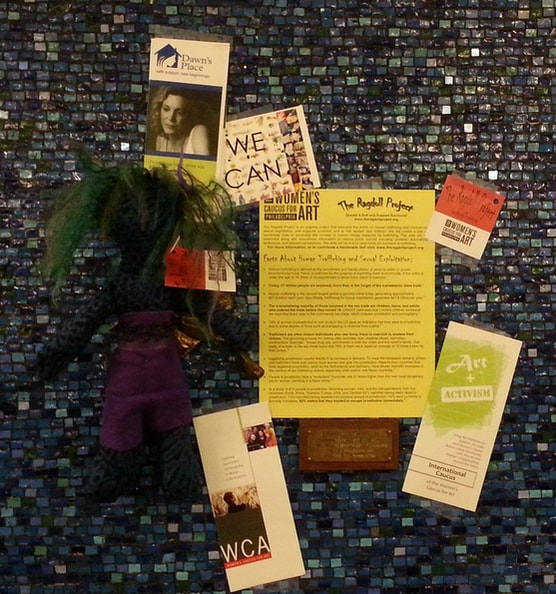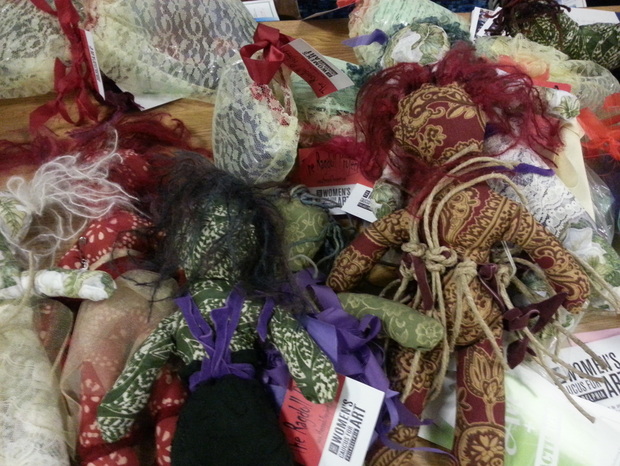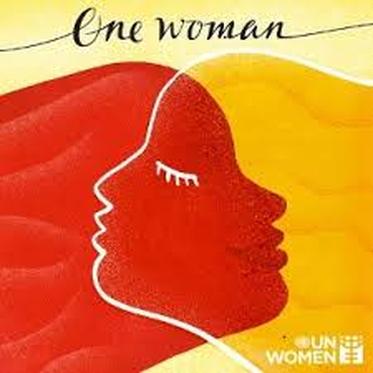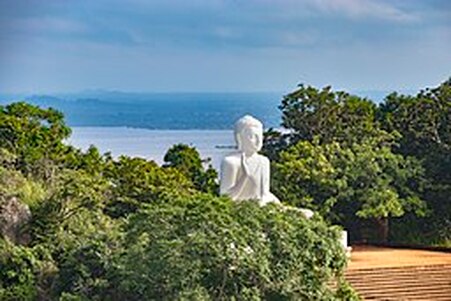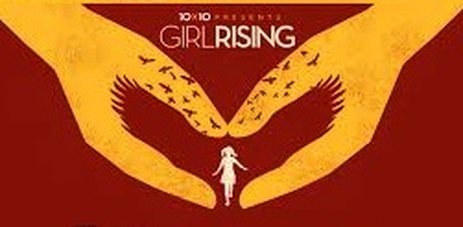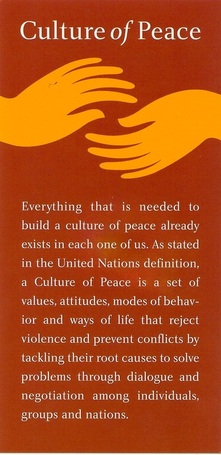UPDATE #1
2013: Creation of the UN Program of International Caucus
2013: Creation of the UN Program of International Caucus
___________________________________________________________________________________
UPDATE #2
UN Report: Stakeholders Forum
Commission on the Status of Women: Violence Against Women
Maureen Burns-Bowie
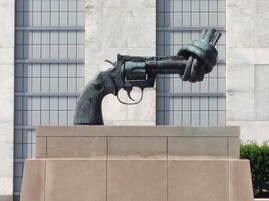
UN photo
Elizabeth Sowell-Zak and I attended a Stakeholders Forum of the Commission on the Status of Women, addressing the issues of violence against women. The main ideas that emerged from the conference are:
NO IMPUNITY
ZERO TOLERANCE
There are universal values that must be recognized. There is no justification for violence against women in any culture, in any tradition.
RE-DEFINE MANHOOD
Target men with more information
Make it cool to be supportive of not allowing violence against women
POLITICAL LEADERS MUST SPEAK UP LOUDLY AND OFTEN
Inspiration and motivation to do right are crucial
More laws with severe consequences are needed
Create ideas and programs that can be replicated –scale up the rhetoric
VICTIMS MUST LEARN HOW TO EXIT AN INTOLERABLE SITUATION
TRANSFER SHAME TO THOSE WHO DO NOTHING
KNOW THE COSTS:
More women between 15 and 44 are at risk from rape and domestic violence than from cancer, war, car accidents, malaria combined
Cost of addressing issues of domestic violence: 1% GDP of a country
THIS IS THE SINGLE MOST IMPORTANT HUMAN RIGHTS ISSUE –WOMEN ARE ONE HALF OF HUMANITY
___________________________________
UPDATE #3
UN Report: Commission on the Status of Women Annual Conference
Maureen Burns-Bowie
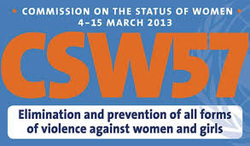
Five members of WCA attended the 2013 Annual UN Conference of the Commission on the Status of Women. Sherri Cornett, Elizabeth Sowell-Zak, Alli Berman, Ana Koshkin, and Maureen Burns-Bowie participated in Consultation Day, Circle Gatherings, and Panels . Negin Sharif Zadeh participated in a women’s event outside the UN including a dance performance, as well as being interviewed by Persian VOA, where she talked about how art can communicate strong socio-political messages. Joanna Fulginiti of the Philadelphia Chapter, sent materials from the Ragdoll Project (The Ragdoll Project | Interdisciplinary Arts and Healing) and they were shared at the Artisan Fair. The presentation was enthusiastically received.
It was dizzyingly wonderful. The intensely positive, collaborative energy was heady stuff. All of the sessions were rich with information presented by women with passion and drive. We met some incredibly inspiring women.
We made connections with NGO’s around the world, shared information about Women’s Caucus for Art, and met dynamic and energetic women, all working to improve conditions for women around the globe. We began putting ideas together for involvement and exhibitions at future conferences.
It was dizzyingly wonderful. The intensely positive, collaborative energy was heady stuff. All of the sessions were rich with information presented by women with passion and drive. We met some incredibly inspiring women.
We made connections with NGO’s around the world, shared information about Women’s Caucus for Art, and met dynamic and energetic women, all working to improve conditions for women around the globe. We began putting ideas together for involvement and exhibitions at future conferences.
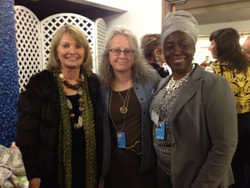
Maureen, Sherri, and Chi Ezekwueche, Chair of Board of Tubman African American Museum, who established Pan African Arts Festival in Georgia, in support of Igbo women.
During the conference this song was released by UN Women to celebrate International Women's Day.
Watch this video:
One Woman: A Song for UN Women - YouTube
It is clear that the age of women being submissive and silent is over. The experience at this conference reminded me of the Civil Rights Movement here in the United States. We have crossed a threshold and there is only movement forward, not backward. ONE BILLION RISING was a significant moment that illustrates the energy of forward movement.
Below is that speech Sherri and I heard, given by Michelle Bachelet:
Michelle Bachelet: UNITED NATIONS UNDER-SECRETERY-GENERAL AND EXECUTIVE DIRECTOR OF UN WOMEN
I am delighted to be here once again to address this wider NGO community on the day before the 57th session of the Commission on the Status of Women officially begins.
I am honoured by the opportunity to meet with so many women and men who have made achieving gender equality and promoting women’s empowerment their life ambition. Your energy and dedication is truly inspiring.
Let me start by thanking the Chair of the NGO Committee on the Status of Women – New York, Ms. Soon-Young Yoon. It is also with great honour that I am speaking on the same occasion as Nobel Peace Prize winner, Tawakkol Karman. She is indeed the brave face of revolution, a woman fighting for change in her society.
This is the third time that I have been given the opportunity to address this important body in the lead up to the Commission on the Status of Women.
I want to say up front that this enthusiastic engagement of civil society sets the tone for the two weeks to come. The time for action is now. Discrimination and violence against women and girls have no place in the 21st century. But change is possible and change is happening.
On the global stage, there have been many major, even newsworthy, achievements for gender equality. The President of the United States has just signed a new Directive to Strengthen Work to Advance Gender Equality Worldwide. On 11 October 2012 the first-ever International Day of the Girl Child was launched and celebrated. Two female presidents were elected, in Malawi and the Republic of Korea, and the African Union has elected its first-ever female chairperson.
Unfortunately, success stories such as these were often overshadowed by stories of persistent and grave human rights violations of women and girls. In countries around the world, women and girls continue to be viciously attacked, raped and killed.
Yet even out of these horrific events we can see that things are changing, that indifference is declining and voices are rising to say, enough is enough.
The momentum is growing and we can hear the rumblings of this call to action among the people, among the thousands of civil society organizations in communities, cities and countries around the world. Women, men, and young people took to the streets with signs that ask “Where is the justice?” with rallying cries that say “Wake up!”
They declared solidarity with a Pakistani girl shot for defending the right to education; they pledged justice for a young woman in India and in South Africa who were brutally raped and later died; they demanded an end to the endless cases of rape and violence that threaten the lives of countless women and girls but never make the headlines.
This call echoed around the world on 14 February, where people left their offices, their homes, their shops, to come together, rise and dance in the One Billion Rising Campaign as an act of defiance against silence, indifference, and injustice.
It is an understatement to say that the priority theme of the 57th CSW, the elimination and prevention of all forms of violence against women and girls, is timely.
The world cannot afford the costs of violence against women and girls. The violence needs to stop. We need to take action. Make no mistake: there can be no peace, no prosperity, no progress, without the full and equal participation of women. Wherever I go, this is the message I convey.
It is the message I conveyed at the recent consultations on inequalities in Copenhagen, where the topic of discussion was nothing less than the future of sustainable development. It has finally become clear that in a post-2015 world, with the lessons we have learned from the Millennium Development Goals, violence against women and girls is undermining all of our development efforts.
This exclusion, this discrimination and this violence based on gender, is one of the biggest obstacles that we face in advancing sustainable development.
As we gather, we say no to all forms of violence against women. No to intimate partner violence, No to early and forced marriage, No to crimes committed in the name of honour or passion, No to female genital mutilation, No to femicide, No to sexual violence, No to sexual harassment, No to trafficking, No to violence condoned by the State and No to violence against women in conflict situations.
Today as many as 7 in 10 women in the world report that they have experienced physical and/or sexual violence at some point in their lifetime. And although 125 countries have laws that penalize domestic violence, for 603 million women, domestic violence is still not a crime in their countries.
No country is immune to this human rights violation, and every country pays a price for these grave impediments to the development of society.
There have been many positive developments in legal frameworks, many of which were propelled by the staunch support of civil society. Now we must take on the challenge of implementation and accountability.
It is our hope that this CSW will result in action on the promises States have made, on the international treaties and agreements they have signed. Because laws and policies aren’t worth the paper they are written on if they do not lead to action.
This is the largest international gathering on ending violence against women, ever. Now is the opportunity for real progress, for new laws and policies that will be enacted, enforced, implemented and “popularized.”
And it is through the support of civil society that national Governments will undertake these measures and take into account groups who are often left behind, such as women living with disabilities, women living with HIV and AIDS, indigenous women, migrant women, adolescent girls and older women.
As we work to achieve the Millennium Development Goals, it is unacceptable to only scratch the surface. We must now effectively tackle the root causes of violence against women and girls. Here is where the State must uphold its part of the bargain, but also where civil society is an indispensable partner.
We need to dig deep: to patriarchal culture, discriminatory socio-cultural practices, unequal distribution of social, cultural and economic power and the economic disempowerment of women. We need awareness-raising, and education, and engagement of both men and women. I have said it many times, and I will say it again: we need to engage young men and boys as partners in our efforts for gender equality.
When we set up UN Women more than two years ago, we made ending violence against women one of our top priorities. And we are fully aware that this requires changing deeply rooted attitudes and cultural norms, and making headway towards equal rights, equal opportunities and equal participation, especially in decision-making.
How is UN Women working in this area? We support the development of laws, national action plans and polices, and capacity-building and training programmes. We provide funding to NGOs and civil society, contribute to advocacy and awareness-raising efforts, and support local initiatives.
Through the UN Trust Fund to End Violence against Women, grantees carry out small-scale but powerful initiatives on the ground. To date, the UN Trust Fund has delivered more than USD 86 million to 351 initiatives in 128 countries and territories.
Our social mobilization and advocacy platform “Say NO-UNiTE to End Violence against Women” has mobilized and obtained the signatures of Heads of States, Ministers and parliamentarians from over 70 countries. It is also a platform for individuals and organization to share what they are doing in their communities, from local outreach to advocacy for legislation that protects women and girls from violence.
Together with UNICEF and UN-HABITAT, we launched a five-year program, “Safe and Friendly Cities for All,” to promote safety of women and girls in public spaces. We work with local leaders and civil society groups to prevent and reduce violence and to mobilize women’s groups, youth and children’s advocates to shape their urban environment. We now work in over 20 cities around the world, and this number continues to rise.
I would also like to highlight that last year in November, I launched UN Women’s COMMIT Initiative, which calls on Governments to implement international agreements on ending violence against women and commit to new, concrete steps to end this human rights violation that affects women worldwide, while building momentum toward the CSW and beyond.
From Togo, to the Republic of Korea, to Australia, to Turkey and Poland, some 40 countries have made clear, implementable national commitments in their countries and we expect to see more such pledges in the coming days.
UN Women supported the successful efforts of a delegation of women peace activists to participate in political stabilization negotiations in Mali during a time of political and humanitarian strife in early 2012.
And in Asia, a historic agreement was signed between the Government of the Philippines and the Moro Islamic Liberation Front, which made provisions that guarantee women the right to meaningful political participation and protection from all forms of violence.
Let me now turn to how are strengthening our partnership with civil society organizations.
Last year I launched the Global Civil Society Advisory Group. Thirteen civil society advisory groups have also been established at the regional, sub-regional and national levels by UN Women and civil society. The first regional group to be set up was for Latin America and the Caribbean, followed by Central and South Eastern Europe. At the sub-regional level, Caribbean and Pacific groups have been created, and nine countries have their own national Advisory Groups – Brazil, Cameroon, Georgia, India, Kyrgyzstan, Moldova, Pakistan, Tajikistan and the United Republic of Tanzania. In 2013, UN Women plans to establish at least 13 more civil society advisory groups around the globe.
These advisory groups are on their way to serving as dynamic forums for dialogue and engagement and I am pleased that about half of the Global group will be here with us during the session– as will some 20 more civil society advisory group members from the Central and Southeastern Europe Region, Latin America and the Caribbean Region, Cameroon, India and Brazil.
I count on their ingenuity, commitment and influence to build bridges among stakeholders, energize constituencies and facilitate information-sharing during the session. I look forward to our engagement during the session and beyond in 2013.
UN Women has also supported the development of a number of new regional NGO CSW Committees. We are grateful to these committees and their partners for the valuable contributions that they have already made to discussions at the CSW 57, through the consultation documents that they have produced and shared with UN Women and the CSW Bureau.
Last year, over 2,000 NGO representatives from 429 organizations participated in the annual session of the Commission on the Status of Women. But despite the invigorating discussions and initiatives by both Member States and NGOs, there were no agreed conclusions, which was very disappointing.
This year, NGO numbers are stronger and expectations for a strong outcome are high. We at UN Women know the value of civil society’s full participation in these, and other important sessions.
That is why we contacted the heads of delegations to make sure that they include representatives of civil society in their governmental delegations at this year’s CSW. UN Women is determined to build alliances with those organizations committed to making a difference in women´s lives.
This year, we are hopeful that the Commission will adopt agreed conclusions which reinforce international norms and standards, with concrete actions that can be implemented to prevent and end violence against women and girls in all its forms.
We strongly believe that policies must be informed by survivors’ experiences and that economic empowerment measures be an essential part of strategies for ending violence against women and girls.
The complexities of violence against women and girls are vast and enormous and the issue requires our full attention– nothing less. UN Women looks to you to share the wealth of knowledge and experience that you can bring to discussions on ending violence against women and girls during parallel events and panel discussions at this session. This is vital to a progressive outcome.
For my part, I remain committed to strengthening the relationship between UN Women and civil society. I remain keen on devising and developing ways to move forward on the issues of common concern and interest–together. I will continue working to expand spaces for civil society to engage in United Nations’ meetings and programs.
Towards the end of last year, during the Stakeholders’ Forum, which UN Women hosted, we heard directly from women survivors of violence. They stated very clearly that we should not ignore their voices and experiences. They want to be part of the solution and they look to the United Nations to devise policies that are strong, multi-pronged and effective.
As we look ahead, we now have the unique opportunity to prioritize gender equality and to shape a post-2015 development agenda based on inclusion, justice and equality.
Inequality is, and will continue to be, the main challenge of our century. Inequalities between men and women, between the wealthy and the marginalized, even between countries and regions have a disruptive impact that we can no longer afford to ignore.
As I mentioned, in the past few months, the international community has been involved in a worldwide consultation process on the topic of inequalities and the future of post 2015 development.
The final report of the addressing inequalities consultations, co-led by UN Women and UNICEF has been quite illuminating.
Listening and involving civil society, women’s rights organizations and individuals from all over the world should be an ongoing endeavor and not a one-time effort.
Dialogue and inclusion must always be at the center when addressing inequalities. Engaging people in development should not be considered a procedural formality, it is our collective duty.
People are not beneficiaries, they are partners in development. Without them, we cannot shape, let alone implement a new development agenda. Women’s full engagement is essential if we are to make women’s empowerment and gender equality a priority post-2015.
The post-2015 agenda will have to rely on a new social contract between States and citizens, which prioritizes inclusion, equality, and democratic participation. It will have to rely on a global governance system that is more just, where there is no room for unfair practices and deep rooted inequalities.
Gender equality must be a priority in the new global development agenda. Nothing short of that goal will deliver on the promise of a more equitable, inclusive, peaceful and sustainable world. Ladies and gentlemen: International Women’s Day is just around the corner. It is a day to celebrate all the advancements we have made so far towards building a world where gender equality is the norm and not the exception.
There are many achievements we can all feel proud of. A girl born today will more likely live and develop in a world that is more conscious of her capabilities and her value. She will have a better chance to study, to work, to speak her mind, than a girl born just half a century ago. She will have a better chance of being involved in designing and fighting for a more equitable, just, and peaceful world.
But our work is far from over because this is not true for every girl born in this world.
This is why International Women’s Day should also be a time to reflect on what still needs to be done. It should be a time to contemplate the challenges ahead, a time to regroup and plan our next steps. It is a time to move forward.
The good news is that violence against women and girls is not inevitable. Violence against women and girls is preventable.
You and I know that we all have a responsibility in ridding our world of violence and that your role as civil society cannot be understated.
Tawakkol Karman, who graces us with her presence today, said in her Nobel Lecture: “I have always believed that human civilization is the fruit of the effort of both women and men. So, when women are treated unjustly and are deprived of their natural right in this process, all social deficiencies and cultural illnesses will be unfolded, and in the end the whole community, men and women, will suffer.”
She goes on to say that “the solution to women’s issues can only be achieved in a free and democratic society in which human energy is liberated, the energy of both women and men together.”
I borrow her words today, not only because I find them truly inspiring, but also because this sentiment is exactly at the core of our efforts for gender equality and women’s empowerment, and for a life free of violence for all.
This is exactly what we need to do: combine the energies of both men and women to transform our world. Only then can we talk of progress. Only then can we assure a development based on inclusiveness and equality. The truth of the matter is we will all find a way towards development, or we will all fail in the attempt.
I want to thank all of you, gathered here today, for your hard work over the years. I know that many of the achievements we are so proud of today, have been made possible by you and others like you: dedicated people, committed to the values of justice, democracy, peace and equality.
You are here today because you believe that no country can advance inclusive growth and equality without protecting the human rights of girls and women to live free of violence and discrimination.
You are here because it will take the full support of Governments and the authority of the law to protect our hard-fought gains for gender equality.
And you are here because your voices are what will move our collective efforts forward. Because together, we can make this the century of inclusion for women.
Change is possible. Change is happening. And I am proud to stand here and to know that we are all a part of it
UPDATE #4
March 20 is the United Nations INTERNATIONAL DAY OF HAPPINESS. Bhutan measures their success as a country by "Gross National Happiness" rather than "Gross Domestic Product". The UN General Assembly resolved "the relevance of happiness and well-being as universal goals...the importance of their recognition in public policy objectives, and the need for a more inclusive, equitable and balanced approach to economic growth that promotes sustainable development, poverty eradication, happiness and the well -being of all peoples"
___________________________________
UPDATE #5
Cyrus Cylinder
Maureen Burns-Bowie
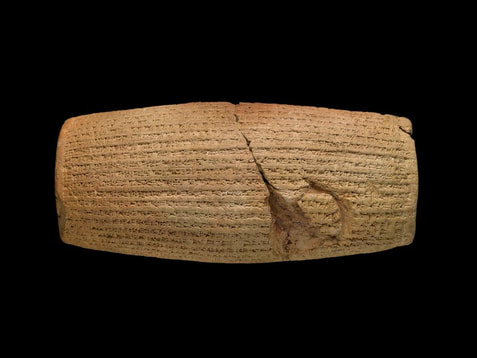
British Museum
Currently touring the US is the original 2600 year old Cyrus Cylinder from Persia, on loan from the British Museum. A clay tablet with cuneiform inscriptions, many refer to it as the first bill of human rights.
The clay document allowed religious freedom to all peoples of the land, allowed conquered Jews to return home, and restored sacred sites of all religions. Religious diversity was embraced. The oppressed were protected. All citizens were respected. The sophisticated, far reaching and utopian ideas expressed on the cylinder have influenced philosophers and statesmen throughout history.
A reproduction of the Cyrus Cylinder is displayed prominently at UNITED NATIONS Headquarters in NYC. The full text is translated into six languages.
It will be at the Freer Sackler in Washington DC, Museum of Fine Arts in Houston, Metropolitan Museum in NY, Asian Art Museum in San Francisco, and Getty Museum in LA.
The attached video is informative. It is ten minutes long, but well worth the time. (It will remind you of Art History class)
Economist: Neil MacGregor: A Great Moment for the Middle East - Cyrus Cylinder US Tour
___________________________________
UPDATE #6
Orientation Program for New NGO Members
Maureen Burns-Bowie
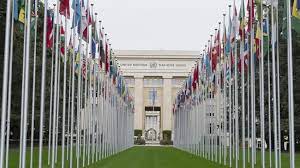
United Nations
In May 2013, Elizabeth Sowell-Zak and I attended the Orientation Program at the UN for new representatives of NGO’s.
As I have stated before, the UN has shifted its emphasis in the direction of much more involvement with NGO’s and civil society, mainstreaming women’s issues into all platforms, and engaging artists as spokespersons. WCA’s interest in increasing engagement with the United Nations comes at a perfect time.
The UN relationship with civil society and NGO's is of utmost importance to Ban Ki Moon. When the MDG’s are revised for a post 2015 era, the use of social media to “vote” on the ideas that people around the world feel strongly about will be listened to closely. Stay in touch with this profoundly new way of thinking about global participation in the struggles that effect us all. View the "World We Want" website: (World We Want 2015). When finished, this will be the most inclusive and democratic document written in human history.
The new wisdom is that all the ills of the world are felt most deeply by women, whether it is poverty, health issues, lack of education, violence of war, or environmental degradation and natural disasters. Since women are 55% of the world, it is not a matter of asking permission to speak, but to merely assert our authority to do so.
And the use of art to convey messages is a priority at the UN. As they have said: “There is a world of stories waiting to be told. Help us tell them”. High profile celebrities, actors, and performers are the first on board right now through “Creative Community Outreach”. 38 major film projects world wide are being planned which are based on stories about the UN. Many concerts are being planned. So the contemporary cultural scene will soon be full of messages from the UN. I have been doing exhaustive research on venues where through the years WCA would be able to mount exhibitions, give presentations and promote discussions. Some are in UN facilities, but I am also pursuing the possibility of working with colleges and universities that have NGO status and wish to be engaged on multiple levels. “Academic Impact” is a new program designed to draw institutions of higher learning into the UN community. I think there would be an enthusiasm to share gallery space and projects. I am also reaching out to artists I know who are doing work that would fit seamlessly into UN Program goals and Women’s Caucus for Art as a whole. I also see possibilities of collaboration with other caucuses such as JWAN, Youth, Eco, and Media. My goal is to work slowly and to build a solid, substantive, and reliable program.
As I have stated before, the UN has shifted its emphasis in the direction of much more involvement with NGO’s and civil society, mainstreaming women’s issues into all platforms, and engaging artists as spokespersons. WCA’s interest in increasing engagement with the United Nations comes at a perfect time.
The UN relationship with civil society and NGO's is of utmost importance to Ban Ki Moon. When the MDG’s are revised for a post 2015 era, the use of social media to “vote” on the ideas that people around the world feel strongly about will be listened to closely. Stay in touch with this profoundly new way of thinking about global participation in the struggles that effect us all. View the "World We Want" website: (World We Want 2015). When finished, this will be the most inclusive and democratic document written in human history.
The new wisdom is that all the ills of the world are felt most deeply by women, whether it is poverty, health issues, lack of education, violence of war, or environmental degradation and natural disasters. Since women are 55% of the world, it is not a matter of asking permission to speak, but to merely assert our authority to do so.
And the use of art to convey messages is a priority at the UN. As they have said: “There is a world of stories waiting to be told. Help us tell them”. High profile celebrities, actors, and performers are the first on board right now through “Creative Community Outreach”. 38 major film projects world wide are being planned which are based on stories about the UN. Many concerts are being planned. So the contemporary cultural scene will soon be full of messages from the UN. I have been doing exhaustive research on venues where through the years WCA would be able to mount exhibitions, give presentations and promote discussions. Some are in UN facilities, but I am also pursuing the possibility of working with colleges and universities that have NGO status and wish to be engaged on multiple levels. “Academic Impact” is a new program designed to draw institutions of higher learning into the UN community. I think there would be an enthusiasm to share gallery space and projects. I am also reaching out to artists I know who are doing work that would fit seamlessly into UN Program goals and Women’s Caucus for Art as a whole. I also see possibilities of collaboration with other caucuses such as JWAN, Youth, Eco, and Media. My goal is to work slowly and to build a solid, substantive, and reliable program.
___________________________________
UPDATE #7
Hopefully We Are Moving Toward Less Violence in Our World
Maureen Burns-Bowie
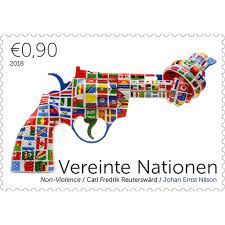
UN stamp
The United Nations General Assembly has passed the first UN Arms Trade Treaty. The United States led the way in this action, and 154 countries voted, with a standing ovation when it was announced that the treaty had passed.
Global regulations are now in effect to control international trade in weapons. Criminals worldwide who have freely exchanged arms and ammunition across borders will now be met with strict legal procedures. It is anticipated that this treaty will help to incapacitate black market dealers, terrorists, and rogue regimes committing unspeakable genocides.
Statement by Lakshmi Puri on the Adoption of the UN Arms Trade Treaty:
UN Women welcomes the adoption of the text of an Arms Trade Treaty in New York and congratulates Member States and Non-Governmental Organizations that lobbied for this important framework. In particular, UN Women hails the inclusion of specific criteria on gender-based violence requiring exporting State parties to consider the risks of arms being used to “commit or facilitate serious acts of gender-based violence or serious acts of violence against women.”
The ATT marks a significant step towards regulating licit arms trades, adding to the existing UN disarmament frameworks. In addition, the agreed conclusions of the 57th session of the Commission on the Status of Women, which concluded on March 15, acknowledged the relationship between the “illicit use of, and illicit trade in, small arms and light weapons and aggravated violence against women and girls.”
The global arms trade must not be a means of aggravating the already catastrophic levels of violence against women around the world, including during conflict and post-conflict. However, UN Women underscores that women are not just of importance to the Arms Trade Treaty as victims of armed violence, but also as peacebuilders and decision-makers.
Women’s crucial role in promoting peace and security, recognized in Security Council resolutions must be recognized in all mechanisms for the monitoring and management of the arms trade.
And as a beautiful counterpoint to dealing with violence, the UN News Center issued the following story:
Global regulations are now in effect to control international trade in weapons. Criminals worldwide who have freely exchanged arms and ammunition across borders will now be met with strict legal procedures. It is anticipated that this treaty will help to incapacitate black market dealers, terrorists, and rogue regimes committing unspeakable genocides.
Statement by Lakshmi Puri on the Adoption of the UN Arms Trade Treaty:
UN Women welcomes the adoption of the text of an Arms Trade Treaty in New York and congratulates Member States and Non-Governmental Organizations that lobbied for this important framework. In particular, UN Women hails the inclusion of specific criteria on gender-based violence requiring exporting State parties to consider the risks of arms being used to “commit or facilitate serious acts of gender-based violence or serious acts of violence against women.”
The ATT marks a significant step towards regulating licit arms trades, adding to the existing UN disarmament frameworks. In addition, the agreed conclusions of the 57th session of the Commission on the Status of Women, which concluded on March 15, acknowledged the relationship between the “illicit use of, and illicit trade in, small arms and light weapons and aggravated violence against women and girls.”
The global arms trade must not be a means of aggravating the already catastrophic levels of violence against women around the world, including during conflict and post-conflict. However, UN Women underscores that women are not just of importance to the Arms Trade Treaty as victims of armed violence, but also as peacebuilders and decision-makers.
Women’s crucial role in promoting peace and security, recognized in Security Council resolutions must be recognized in all mechanisms for the monitoring and management of the arms trade.
And as a beautiful counterpoint to dealing with violence, the UN News Center issued the following story:
AS UN MARKS BUDDHIST HOLIDAY, BAN SAYS SPIRITUAL IDEALS CAN HELP TACKLE GLOBAL CHALLENGES
The teachings of Buddhism can offer significant insights on how to face today's most pressing challenges, Secretary-General Ban Ki-moon said in a message marking Vesak Day, May 24, which commemorates the birth, enlightenment and passing of the Buddha.
“Now more than ever, we need the spirit of non-violence to help inspire peace and quell conflict,” Mr. Ban said.
“This year's observance, falling at a time of widespread strife and misery, is an occasion to examine how Buddhist teachings can inform our response to prevailing challenges.”
Mr. Ban noted that confronting troubling problems is a big part of Buddhism as the Buddha himself – when he was a young prince – left the safety of his palace to discover the four sufferings of birth, sickness old age and death.
“While such painful realities cannot be avoided, Buddhism offers insights into how to cope with them. Its history is replete with inspiring examples of the transformative power of Buddhist philosophy,” he said.
Mr. Ban also recalled that King Ashoka, who presided over a brutal reign in India in from 268-232 B.C., ultimately converted to Buddhism, renouncing violence and embracing peace.
“The values that King Ashoka espoused, including human rights, democratic governance and respect for the dignity of life, are common to all great religions. The fact that he was able to embrace them after years of brutal war offers proof that the goodwill of individuals can end widespread suffering.”
Mr. Ban offered his best wishes to Buddhists and expressed his sincere hope that “we may all draw on spiritual ideals to strengthen our resolve to improve our world.”
___________________________________
UPDATE #8
Celebrate the Courage of Malala Yousafzai
and
See "Girl Rising"
Maureen Burns-Bowie
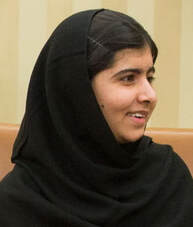
Pete Souza
CNN REPORT:
London: Malala Yousafzai, who emerged as a global icon for women's rights after being shot at by Taliban for advocating girl's education in Pakistan, will give her first public speech in New York on her 16th birthday on July 12, a day that would now be marked as 'Malala Day'. UN Special Envoy and former British Prime Minister Gordon Brown announced that Malala is determined to continue campaigning for girls' education and will speak to a specially convened meeting of young people from around the world at the United Nations.
A petition signed by one million children, who are denied schooling, will be handed over to the UN Secretary General Ban Ki-Moon on the same day, with an aim to pass a resolution at the UN to end all forms of child slavery, labour, marriage and discrimination against girls. Currently, 61 million children go without a single day of primary school.
Malala, who has made a remarkable recovery and has since returned to school, is yet to make a public speech. A passionate campaigner for a long time for the right of every girl to attend school, Malala will be making the case that the voice of young people is essential in the fight for education.
The Malala Day meeting will close with a youth resolution to make education for all a reality by the end of 2015, as was promised in the second Millennium Development Goal in 2000.
As part of this increased awareness of the importance of girls'education, a film called "Girl Rising" has been produced.
It is nine profiles of strong and fearless young girls who defied convention and survived numerous hardships for the privilege of an education.
The will break your heart and inspire you at the same time. This is a crucial issue in women's rights. The only way the world can thrive is through educated girls.
See previews and learn more about the film:
The 10x10 Film: Girl Rising | 10x10
Girl Rising - CNN.com
________________________________________
UPDATE #9
Malala
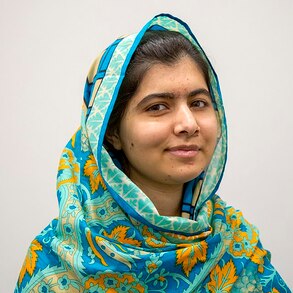
Simon Davis/DFID
Malala Yousafzai, shot close range in the head by Pakistani Taliban for advocating girls education, celebrated her 16th birthday at the UNITED NATIONS on July 12. Wearing a shawl once owned by Prime Minister Benazir Bhutto she declared: "Let us pick up our books and pens. They are our most powerful weapons. One child, one teacher, one pen and one book can change the world. Education is the only solution...They shot my friends too. They thought that the bullets would silence us. But they failed and out of that silence came thousands of voices...The terrorists thought they would change my aims and stop my ambitions, but nothing changed in my life except this: weakness, fear and hopelessness died. Strength, power and courage was born...I am not against anyone....I do not even hate the talib who shot me."
___________________________________
UPDATE #10
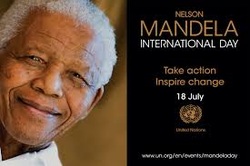
Nelson Mandela Day
July 18
The objective of Mandela Day is to inspire individuals to take action to help change the world for the better, and in so doing build a global movement for good. Ultimately it seeks to empower communities everywhere.
July 18
The objective of Mandela Day is to inspire individuals to take action to help change the world for the better, and in so doing build a global movement for good. Ultimately it seeks to empower communities everywhere.
___________________________________
UPDATE #11
Samantha Power
Maureen Burns-Bowie
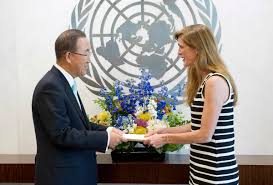
UN
Samantha Power has been appointed the United States' new ambassador to the United Nations. A longtime human rights activist, journalist, and scholar, she is the youngest ambassador in history. Her feisty personality will ensure that she is heard on the floor of the Security Council. She has said, "whether it's terrorism or the broader range of security concerns, mass atrocities in Syria, fighting in South Sudan, the effort to alleviate global poverty, the crackdown on civil society around the world....there are just so many issues where the United States and the United Nations have to work together to achieve progress."
She is a staunch supporter of women's rights, LGBT rights, with other deep concerns for refugees and victims of human trafficking, religious freedoms, human rights, and democracy.
She is a staunch supporter of women's rights, LGBT rights, with other deep concerns for refugees and victims of human trafficking, religious freedoms, human rights, and democracy.
_______________________________
UPDATE #12
Culture of Peace
Maureen Burns-Bowie
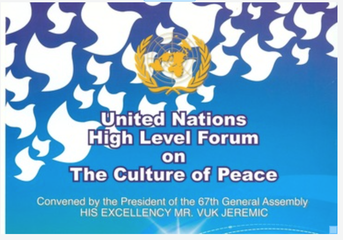
On September 6, I attended a UN General Assembly High Level Forum on the Culture of Peace.
The "war machine" is a highly organized, codified, funded and applauded series of strategies that has had traction in the world for thousands of years. The United Nations' position is that a "peace machine" needs to be developed as a necessary alternative. Besides the devastation, destruction, and death left in the wake of war, it simply does not work in the modern world. Nor can we afford it. Facing total annihilation if wars escalate, the alternatives of wisdom and diplomacy are clearly the more desirable tools.
Peace in the world will depend upon education, ample natural resources, financial commitment, equality of all people, sustainability, and democracy. It is an ambitious goal, but one that CAN be achieved if we are thoughtful and determined.
We have been steeped in war throughout human history. The UN is advocating an agenda with a clear cut program of action for a culture of peace, a "war against war".
Martin Luther King declared that "those who love peace must learn to organize as effectively as those who love war"
Peace begins within each individual, then radiates to family, community, nations and the world Education is the foundation, and children must begin life with this universal value. A culture of peace is not an absence of war but a vehicle for a full and fruitful life. A culture of peace not only addresses political aggression and battlefields, but responsibility to community and a safe, secure existence for everyone. A culture of peace is also about inner light, empathy, engagement, and forgiveness.
We must look to the farthest horizon as well as take small steps today. This will take a very long time. Bu
as Abigail Disney observed in her presentation: "A goal that can be achieved in my lifetime is too small."
|
TO LEARN MORE, GO TO THIS SITE: Declaration and Programme of action on a Culture of Peace (UN/GA/A/Res/53/243) |
EIGHT ACTION AREAS OF THE UNITED NATIONS PROGRAM OF ACTION OF A CULTURE OF PEACE
1. Fostering a culture of peace through education 2. Promoting sustainable economies and social development 3. Promoting respect for all human rights 4. Ensuring equality between women and men 5. Fostering democratic participation 6. Advancing understanding, tolerance, and solidarity 7. Supporting participatory communication and the free flow of information and knowledge 8. Promoting international peace and security |
_______________________________
UPDATE #13
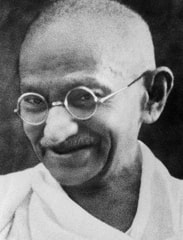 Wiki commons
Wiki commons
UNITED NATIONS INTERNATIONAL DAY OF NON-VIOLENCE
Honoring the birthday of Mahatma Gandhi ("Great Soul")
October 2
"Be the change you wish to see in the world"
Gandhi established "Satyagraha" (Devotion to Truth), a new way to address human rights issues - non violent civil disobedience
"A small body of determined spirits fired by an unquenchable faith in their mission can alter the course of history"
"First they ignore you, then they ridicule you, then they fight you, and then you win"
______________________________
UPDATE # 14
Valuing Nurturing:
Caregivers of People and the Environment
Maureen Burns-Bowie
In discussing the elimination of hunger and poverty, one element that often comes up is the issue of "unpaid workers". The United Nations has done a service to all caregivers by elevating the status of those who are perceived as not having jobs ad not contributing to the economy. UN Special Rapporteur on Extreme Poverty, Magdalena Sepulveda has stated that we must address women's greater vulnerability to poverty. She stresses that unpaid caregiving must be valued for its humanitarian as well as economic contributions. Unequal distribution of familial responsibilities combined with damaging gender stereotypes is a major human rights issue. She stated: "It is unacceptable in the 21st century, unpaid care work such as cooking, childcare, looking after frail older relatives ad fetching water and fuel, which heavily contribute to economic growth and social development, are not better valued, supported, or shared"
Addressing its' ongoing battle against hunger, the UN has declared 2013 as the International Year of Quinoa. The crop is hearty and this vitamin and protein rich food contains most required nutrients. The General Assembly adopted a resolution whose theme was "Quinoa, a Future Sown Thousands of Years Ago". In this pronouncement, they recognized and thanked indigenous people of the Andes "who have managed to preserve quinoa in its natural state as food for present and future generations through ancestral practices of living in harmony with nature".
_______________________________
UPDATE # 15
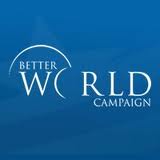
NEW OCTOBER 2013 POLL SHOWS UNTED STATES CITIZENS EXPRESS STRONG SUPPORT FOR UN
The Better World Campaign issues results of polling done by Public Opinion Strategies and Hart Research of Americans' views of the United Nations:
The UN has a favorability rating of 60%
The US Congress has a favorability rating of 22%
92% believe it is important that the UN oversee the collection and destruction of Syria's chemical weapons and provide humanitarian aid, relief and shelter to Syria's refugees.
83% say the US should support the UN's work to build peace in countries emerging from conflict
92% say the US should support the UN's work to improve the health of women and children in poor, developing countries by making sure they
have access to vaccines and maternal health care.
87% say the US should support the UN's work to promote gender equality, women's rights, and the advancement of women and girls around the world
88% say that it is important the US maintain an active role in the UN
63% support paying our dues on time and in full
71% support paying peacekeeping dues on time and in full
The Better World Campaign issues results of polling done by Public Opinion Strategies and Hart Research of Americans' views of the United Nations:
The UN has a favorability rating of 60%
The US Congress has a favorability rating of 22%
92% believe it is important that the UN oversee the collection and destruction of Syria's chemical weapons and provide humanitarian aid, relief and shelter to Syria's refugees.
83% say the US should support the UN's work to build peace in countries emerging from conflict
92% say the US should support the UN's work to improve the health of women and children in poor, developing countries by making sure they
have access to vaccines and maternal health care.
87% say the US should support the UN's work to promote gender equality, women's rights, and the advancement of women and girls around the world
88% say that it is important the US maintain an active role in the UN
63% support paying our dues on time and in full
71% support paying peacekeeping dues on time and in full
_______________________________
UPDATE # 16
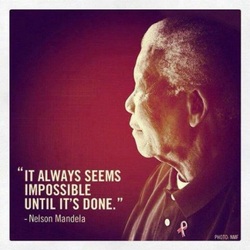
Death of Nelson Mandela
December 5, 2013
UN News Center
Secretary-General Ban Ki-moon has expressed his profound sadness at the passing of Nelson Mandela, extolling the life of the late human rights lawyer, prisoner of conscience, international peacemaker and first democratically-elected President of post-apartheid South Africa as an inspiration for us all.
Mr. Ban noted that many people worldwide were greatly influenced by Mr. Mandela's selfless struggle for human dignity, equality, and freedom. "He touched our lives in deeply personal ways. At the same time, no one did more in our time to advance the values and aspirations of the United Nations
December 5, 2013
UN News Center
Secretary-General Ban Ki-moon has expressed his profound sadness at the passing of Nelson Mandela, extolling the life of the late human rights lawyer, prisoner of conscience, international peacemaker and first democratically-elected President of post-apartheid South Africa as an inspiration for us all.
Mr. Ban noted that many people worldwide were greatly influenced by Mr. Mandela's selfless struggle for human dignity, equality, and freedom. "He touched our lives in deeply personal ways. At the same time, no one did more in our time to advance the values and aspirations of the United Nations
